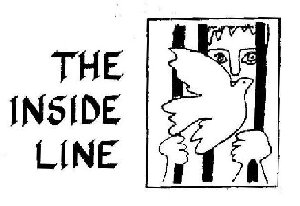

- from Connecticut:


- from Connecticut:
Mark Colville
December 1, 1999, from Carl Robinson Correctional
Facility
From the Advent/Christmas 1999 newsletter of the Cesar Jerez Catholic
Worker
Everything was going along just fine. We were sharing sustenance and
hospitality with neighbors and strangers on a daily basis. We were visiting
the sick and the prisoners; we were helping families in crisis. Students
from Fairfield Prep, Quinnipiac College and Yale were serving meals on
the street in Kimberly Square, and some even took part in the weekly vigil
against war at the federal building. The Give and Take was going great,
with neighbors and volunteers doing most of the work. Thanksgiving was
two weeks away; St. George's, St. Margaret's, Ascension and Rachel's Table
had pledged enough turkeys to cover the hundred and something families
on our list. 
And then, a very inconvenient thing happened. I got sent to jail for thirty days.
It was back in July when we - Cal Robertson, Hillel Arnold, Brian Kavanagh, Jim Noonan, myself - entered the office of Senator Joe Lieberman in Hartford, and refused to leave... On July 2 we walked into his office, knelt on the carpet, and rang a bell every 12 minutes to announce that another Iraqi child had died because of the U.S.-led blockade against Iraq. We also displayed pictures of American children frolicking on bomber planes, tanks, machine guns and other assorted military hardware, pictures taken at the annual air show at Maryland's Andrews Air Force Base. The point was to demonstrate that the violent tendencies in the up-and-coming generation are not of mysterious origin; kids are simply learning well the lessons that the adults are teaching.
It took four months, but the matter finally came to court, and here we are - Brian, Cal and I - in an Enfield jail through Thanksgiving and the first two weeks of Advent.
Of all times to be away, this could be the worst. Catholic Worker Houses can be bedlam around the Holidays, and ours is already shorthanded. On a personal level, Luz and I have been recovering from a crisis in our marriage. We weren't prepared for this, and we don't know how a month's separation might affect us now.
Whenever one of us goes to jail, it opens us to criticism from friends and relatives who, by their own admission, don't quite get it. "You can't do this now!" they say. "What about the house? Who's going to 'run' it? How will the newsletter get done? What about the turkeys? You have a family; why don't you let the others go to jail? What a waste! You could be doing so much more good for people, here on the outside..." I've even been told, by someone close enough to know better, that I'm setting a bad example for my children.
Aside from the more obvious responses - i.e., that the timing and duration of this junket through the human dumpsters of Connecticut were decided without our input - we try to address some of the assumptions which seem to underlie these expressions of heartfelt concern. Our community is not "run" by me or some other untitled executive director. Each of us is precious, but none indispensable, and the works of justice and peace are a necessary extension of the works of mercy. Also, one's personal life circumstances - in my case, the fact that I'm a husband and father - do not provide some kind of exemption from the Christian obligation to non-cooperate with a death-dealing government. Lest anyone forget, it is this government, and the legal apparatus that sanctifies its crimes, that is responsible for our incarceration. We didn't choose to go to jail; we chose to kneel on the senator's carpet and tell him, "You shall not kill". (If this sounds like the splitting of hairs, I can assure you that it's a very important distinction to make when you're doing time, away from loved ones and community.)
And, by the way, going to jail does not exactly remove one from the poor, the marginalized, the hurting and despised - those for whom we do the works of mercy. Let's face it, people in jails and prisons are for the most part considered non-entities: faceless, voiceless, without rights or relevance, and largely deserving of whatever punishment they've been given. There is plenty work for a follower of Christ to do in here, and it can be done from a perspective of solidarity that is simply unattainable for a White, North American male (or female) in this day and age, anywhere else. Out there we're the do-gooders, the helpers, the heroes, with our good name and reputation intact. In here, we're more like Jesus, and just like everybody else: guilty.
That's the way it should be. Thank God for the opportunity to be identified among the prisoners. Thank God for the freedom to go to jail.
